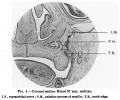File:Fawcett1911 fig04.jpg: Difference between revisions
From Embryology
(Z8600021 uploaded a new version of File:Fawcett1911 fig04.jpg) |
mNo edit summary |
||
| Line 1: | Line 1: | ||
==Fig. 4. Coronal section Minot 37 mm embryo== | |||
I.N., supraorbltal nerve; P.M., palatine process of maxilla; T.R., tooth ridge. | |||
Latest revision as of 22:39, 22 May 2017
Fig. 4. Coronal section Minot 37 mm embryo
I.N., supraorbltal nerve; P.M., palatine process of maxilla; T.R., tooth ridge.
| Historic Disclaimer - information about historic embryology pages |
|---|
| Pages where the terms "Historic" (textbooks, papers, people, recommendations) appear on this site, and sections within pages where this disclaimer appears, indicate that the content and scientific understanding are specific to the time of publication. This means that while some scientific descriptions are still accurate, the terminology and interpretation of the developmental mechanisms reflect the understanding at the time of original publication and those of the preceding periods, these terms, interpretations and recommendations may not reflect our current scientific understanding. (More? Embryology History | Historic Embryology Papers) |
Reference
Fawcett E. The development of the human maxilla, vomer, and paraseptal cartilages. (1911) J Anat. Physiol. 45(4): 378-405.
Cite this page: Hill, M.A. (2024, May 18) Embryology Fawcett1911 fig04.jpg. Retrieved from https://embryology.med.unsw.edu.au/embryology/index.php/File:Fawcett1911_fig04.jpg
- © Dr Mark Hill 2024, UNSW Embryology ISBN: 978 0 7334 2609 4 - UNSW CRICOS Provider Code No. 00098G
File history
Click on a date/time to view the file as it appeared at that time.
| Date/Time | Thumbnail | Dimensions | User | Comment | |
|---|---|---|---|---|---|
| current | 22:39, 22 May 2017 |  | 900 × 738 (182 KB) | Z8600021 (talk | contribs) | |
| 22:38, 22 May 2017 |  | 1,111 × 930 (201 KB) | Z8600021 (talk | contribs) |
You cannot overwrite this file.
File usage
The following page uses this file:
